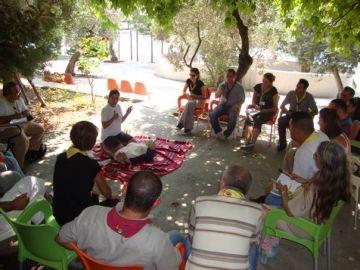
WORLD FIRST AID DAY 2013 A GREAT OPPORTUNITY TO SERVE AND SAFETY FOR OUR MEMBERS
Every year on second Saturday over 100 countries National members celebrates and promotes FIRST AID. This year as a part of Messengers of Peace Project we must involve on actions 8 September with festivities Awareness programmes games for our members to make their Scouting life more safe. Making people aware on First aid and CPR, Learning to get proficiency on first aid and CPR aid is a service to our communitirs
All National oreganizations Have programs on training, awareness,proficiency award progems and experience on camps on cities. We can share these very valuable resources on mesengers of Peace proects by making programa and sharing them here on this peroect as comments and send to out National Res cross and Red Crescent organiation
Visit International Federation of red cross and Red crescent for further information
World First Aid Day 2010: First aid for all http://www.ifrc.org/en/news-and-media/news-stories/international/world-first-aid-day-2010-first-aid-for-all/
Published: 6 September 2011 11:34 CET
In Belize, it was primary school children who received training in basic first aid, CPR and how to help someone who is choking. IFRC
Each year, National Red Cross and Red Crescent Societies around the world observe World First Aid Day. The day is marked on the second Saturday of September with activities and events aimed at raising awareness among the general population of how first aid can save lives. The ability to act quickly and appropriately in an emergency is crucial, whether it be in an everyday emergency or a disaster situation. As the number of small- to medium-sized disasters increases year on year, the need to teach basic first-aid skills to individuals and communities has never been more important.In 2010, the day was marked globally with the theme of ‘First aid for all’ and Red Cross Red Crescent activities around the world reached more 20 million people. Despite the obvious benefits of learning first aid, there are a number of reasons why people do not act in an emergency, including fear of liability, lack of knowledge about the right course of action or ‘bystander syndrome’ – just assuming someone else will know what to do.Targeting the youngIn the UK, a campaign aimed at young people aged 11 to 16 was designed to build their propensity to act. A survey, commissioned by the British Red Cross, found that one in seven of 11- to 16-year-olds had been faced with an emergency in the previous 12 months in which one of their friends had drunk too much alcohol. As well as dealing with alcohol-related problems, the campaign aims to help teach children how to help people with asthma attacks, head injuries, choking and epileptic seizures.In Belize, it was primary school children who received training in basic first aid, CPR and how to help someone who is choking. Choking is perhaps the one emergency situation where seconds really do count. With a blocked airway, brain damage can start to occur after just 90 seconds, but surprisingly, few people know what to do and young children are particularly at risk.First aid is more than a skill – it’s an act of humanityBut another reason why people are not trained in first aid is because they do not have access to first-aid training. Last year, the IFRC launched a report, First aid for a safer future, which called on governments to bridge the gap between richer and poorer communities’ access to first-aid training courses. Government policies – like making first-aid education compulsory in schools or among driving licence applicants – can help to make a difference, but more needs to be done to reach vulnerable groups.In the aftermath of a disaster, community-based volunteers, trained in first aid, are usually among the first to respond. They are on the ground, ready to help people in need. This builds stronger communities who are able to take action in the first instance. And this is where first aid goes beyond just being a skill – it’s about building longer-term community resilience with humanitarian values at its heart.
World First Id DAY 2012
http://www.ifrc.org/what-we-do/health/first-aid-saves-lives/world-first-aid-day2012/
2013-09-08